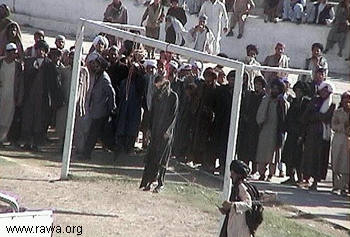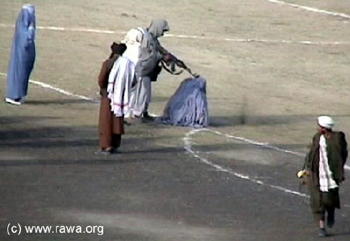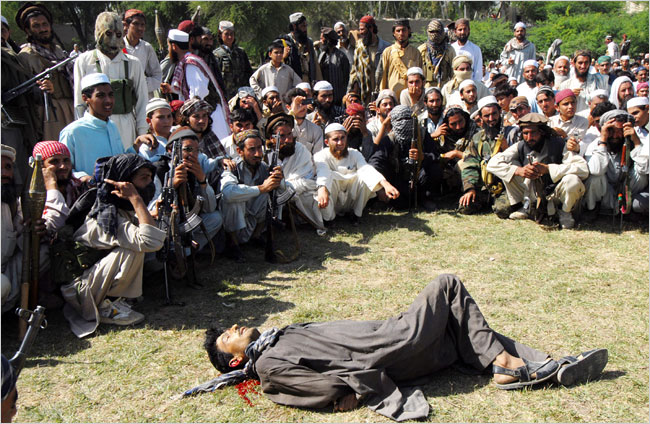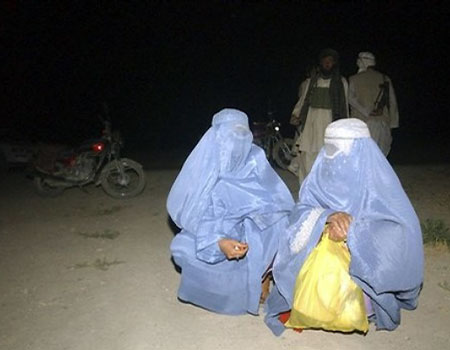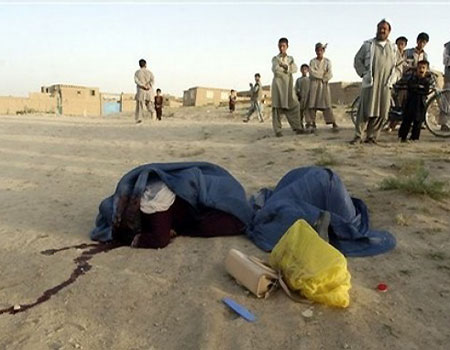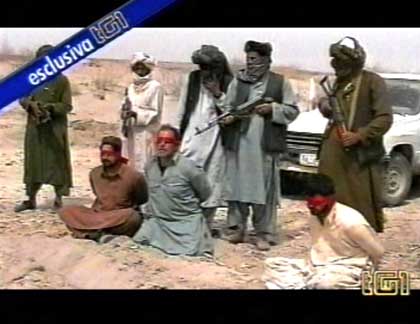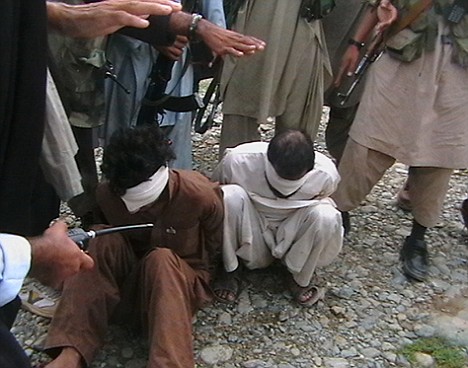Among those the Washington Post outed as briefed in 2002 on the use of waterboarding and other aggressive interrogation techniques was Congresswoman Jane Harman (D-CA). She was reportedly the only one uncomfortable so she wrote a letter to herself and publicly released it a couple years later (others asked if they were being tough enough). Squeamish or not about how America treats detainees, Congressman Harman apparently thinks some indefinite detentions and interrogations of foreigners are necessary:
(March 12, 2009) Washington, D.C. — Rep. Jane Harman (D-CA), Chair of the Homeland Security Subcommittee on Intelligence and Terrorism Risk Assessment, together with co-authors Rep. Ellen Tauscher (D-CA), Chair of the Armed Services Subcommittee on Strategic Forces; Rep. Ed Royce (R-CA), Ranking Member of the Foreign Affairs Subcommittee on Terrorism, Nonproliferation, and Trade; and Rep. Gerry Connolly (D-VA), Member of the Foreign Affairs Committee, today introduced legislation conditioning US military aid to Pakistan on access to A.Q. Khan by US officials and assurances that he is being monitored.
Harman issued the following statement:
One of the most important challenges confronting the intelligence community is learning the nature of and damage done by the worldwide network in nuclear centrifuge technology, bomb components and training run for almost two decades by A. Q. Khan – the revered “father” of his country’s nuclear program. Considered a pariah abroad but a hero at home, that task got a lot tougher when Pakistan’s High Court ordered Khan released from house arrest last month.
At the recent Wehrkunde Security Conference in Munich, Pakistani Foreign Minister Shah Mehmood Qureshi astonished delegates, telling us that his government had not decided whether to challenge the court decision but that Pakistan would continue to monitor Khan.
For those who stay awake at night worrying about Iran’s increasing mastery of centrifuge technology and the ability of terror groups to access nuclear components, Pakistan’s action is distressing.
When Khan “confessed” in 2004 to his illegal nuclear dealings, he was promptly placed under “house arrest” and pardoned by then President Pervez Musharraf. The U.S. government was denied access to him, and was never able to question him about what he did and what else he knew.
Today, we introduce bi-partisan legislation to condition future military aid to Pakistan on two things: that the Pakistani Government make A.Q. Khan available for questioning and that it monitor Khan’s activities. [emphasis added mine]
This much we do know. As a university student in Europe in the late 1960s and early 1970s, Khan earned degrees in metallurgical engineering from institutions in Holland and Belgium. In 1972, he began working for the Dutch partner of a uranium enrichment consortium and almost immediately raised eyebrows for repeated visits to a facility he was not cleared to see and for inquiries made about technical data unrelated to his own assignments.
Dutch intelligence quietly began to monitor him. In 1974, following India’s first nuclear test, Khan offered his expertise to Pakistani Prime Minister Zulfikar Ali Bhutto. Later that year, Khan’s company assigned him to work on Dutch translations of advanced, German-designed centrifuges — data to which he had unsupervised access for 16 days.
By 1975, the damage appears to have been done. Pakistan began to purchase components for its domestic uranium enrichment program from European suppliers, and Khan was transferred away from enrichment work due to concern about his activities.
In December, he abruptly returned to Pakistan with blueprints for centrifuges and other components and detailed lists of suppliers.
Convicted in absentia by the Dutch government for nuclear espionage, beginning in the mid-1980s, Khan is widely believed to have provided nuclear weapons technology to Iran, North Korea, Libya and possibly Syria and Iraq. His network involved front companies and operatives in Dubai, Malaysia, Singapore, South Africa, South Korea, Switzerland and Turkey. Though much of the network was taken down following his confession, there is no conclusive evidence that it was destroyed.
Khan is again a loose nuke scientist with proven ability to sell the worst weapons to the worst people. Hopefully, appropriate Pakistani officials worry as we do that their civilians could become nuclear targets — as could NATO soldiers in neighboring Afghanistan or civilians in any number of Western countries.
Our bill provides a path for the Zardari government to do the right thing –- to allow the US to evaluate the full extent of A. Q. Khan’s proliferation activities in order to halt any ongoing or future harm.
It makes me wonder if Congresswoman Harman was the one who said “pour it on” back in 2002. But I digress.
There seems little chance she’ll get to question Dr. Khan:
(March 13, 2009) The United States had stopped military and economic assistance to Pakistan in 1990, following a dispute over its nuclear programme.
Diplomatic observers in Washington, however, say that it would be difficult to bring such sanctions against Pakistan at this stage when the United States wants the allied nation to increase its role in fighting terrorism.
Pakistan is already resisting Washington’s offer for greater US involvement in training the Pakistani military.
Senior US officials and lawmakers — such as Vice President Joe Biden and Senator John Kerry, who heads the powerful Senate Foreign Relations Committee — have described the previous sanction against Pakistan as a mistake and opposed any future sanctions.
US officials say that the previous sanction, known as the Presslar [sic] Amendment, reduced their influence in Pakistan, particularly in the military, and has left bitter memories in that country.
Maybe Congress ought to leave foreign policy negotiations to the President.

